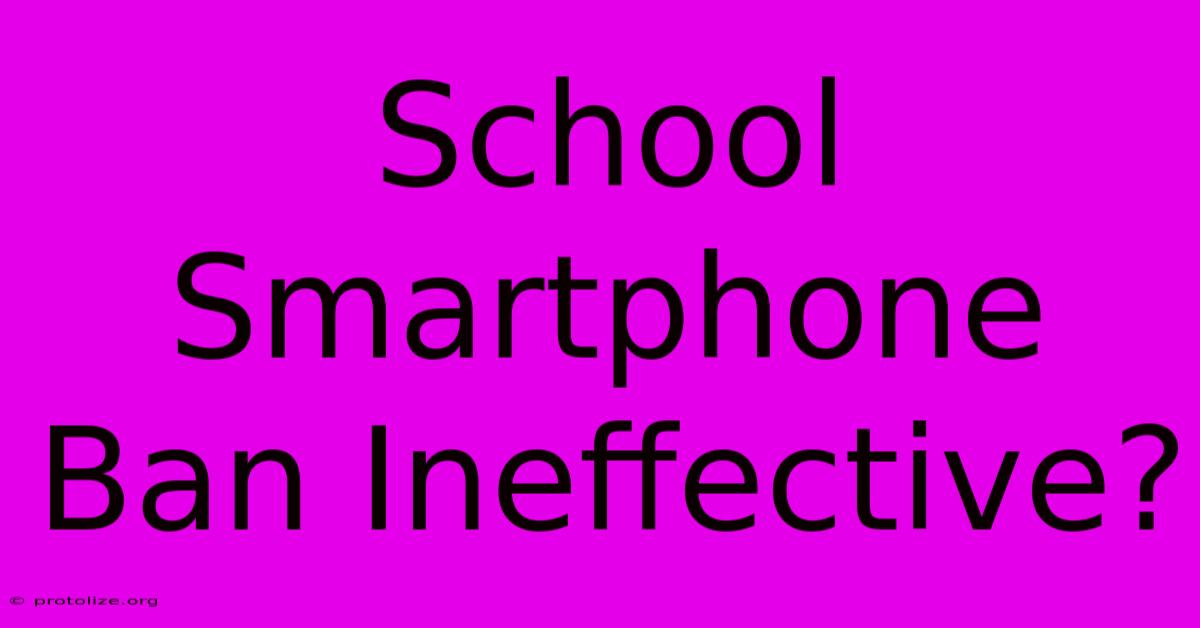School Smartphone Ban Ineffective?

Discover more detailed and exciting information on our website. Click the link below to start your adventure: Visit Best Website mr.cleine.com. Don't miss out!
Table of Contents
School Smartphone Ban Ineffective? A Deeper Dive into the Debate
The debate surrounding smartphone bans in schools is far from settled. While proponents argue for increased focus, less distraction, and a safer learning environment, a growing body of evidence suggests that blanket bans may be ineffective, and potentially even counterproductive. This article explores the arguments for and against school smartphone bans, examining their real-world impact and proposing alternative solutions.
The Arguments for Smartphone Bans
Proponents of school smartphone bans often cite the following reasons:
-
Increased Focus and Reduced Distractions: The primary argument is that smartphones are a major source of distraction in the classroom, hindering learning and reducing student engagement. The constant buzz of notifications, the allure of social media, and the potential for gaming can disrupt lessons and prevent students from fully concentrating on their studies.
-
Improved Classroom Behavior: Some believe that banning smartphones can lead to a more disciplined and respectful classroom environment. By removing a common source of conflict and disruptive behavior (e.g., cyberbullying, inappropriate content), schools aim to create a more conducive learning atmosphere.
-
Enhanced Safety and Security: Concerns about cyberbullying, sexting, and access to inappropriate content online are also driving forces behind smartphone bans. Schools aim to protect students from potential harm by restricting access to these technologies during school hours.
The Counterarguments: Why Bans Often Fail
Despite the intentions behind them, school smartphone bans frequently prove ineffective and often yield unintended consequences:
-
Ineffective Enforcement: Completely enforcing a ban is incredibly challenging. Students often find ways to conceal their devices, leading to a climate of distrust and undermining the school's authority. The energy spent on enforcement could be better directed towards other educational initiatives.
-
Exacerbated Digital Divide: Bans disproportionately affect students from low-income families who may rely on smartphones for communication, access to educational resources outside of school, and contacting family in emergencies. This widens the existing digital divide, creating further inequalities in the educational system.
-
Lack of Technological Literacy: Instead of addressing the underlying issue of responsible technology use, bans avoid teaching students crucial digital literacy skills. Students need to learn how to navigate the digital world safely and responsibly, not simply be prohibited from using technology altogether.
-
Missed Opportunities for Learning: Smartphones can be powerful learning tools. Educational apps, research resources, and collaborative platforms offer immense potential for enriching the learning experience. Bans prevent students from accessing these valuable resources.
Alternative Approaches to Smartphone Use in Schools
Rather than imposing outright bans, schools should consider alternative approaches that promote responsible technology use:
-
Develop Clear Technology Policies: Establish comprehensive policies that outline acceptable use guidelines, address cyberbullying, and define consequences for violations.
-
Integrate Technology into the Curriculum: Teach students digital literacy skills and responsible technology use. Incorporate smartphones and other devices into lessons where appropriate, leveraging their potential for learning.
-
Provide Designated Device Storage: Create secure spaces where students can store their devices during class, removing the temptation to use them during lessons.
-
Educate Parents and Students: Work with families to develop a shared understanding of responsible smartphone use both inside and outside of school.
Conclusion: A Balanced Approach is Key
A blanket ban on smartphones in schools is rarely the answer. Instead, a more nuanced and balanced approach is needed, one that focuses on education, responsible technology use, and clear guidelines rather than outright prohibition. By empowering students with the skills and knowledge to use technology responsibly, schools can create a safer and more productive learning environment for everyone. The focus should shift from restricting access to fostering a culture of responsible digital citizenship.

Thank you for visiting our website wich cover about School Smartphone Ban Ineffective?. We hope the information provided has been useful to you. Feel free to contact us if you have any questions or need further assistance. See you next time and dont miss to bookmark.
Featured Posts
-
The Voices Newest Winner Revealed
Dec 11, 2024
-
Champions League Real Madrid Triumph
Dec 11, 2024
-
Crm Notfallmedizin
Dec 11, 2024
-
How Many Soldiers Does The Crm Have
Dec 11, 2024
-
Sage 100 Crm
Dec 11, 2024
